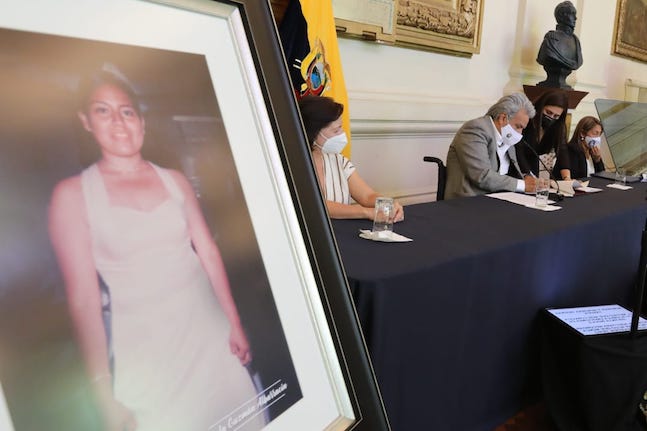Ecuador’s President Issues Public Apology for Teenager’s Death in Landmark Sexual Violence Case
Apology Stems from Ruling in the Center’s Victory at Inter-American Court of Human Rights
President Lenín Moreno of Ecuador today held a public act of recognition of responsibility for the sexual violence suffered by teenager Paola Guzmán Albarracín that led her to suicide nearly two decades ago. The apology was in compliance with a ruling issued in the case of Paola Guzmán Albarracín v. Ecuador by the Inter-American Court of Human Rights (IACHR) that held Ecuador responsible for failing to protect Paola and that set standards to protect schoolgirls from sexual violence throughout the Latin American region.
“Petita and Denisse, I can only say one and a thousand times, a thousand apologies for what happened, a thousand apologies because this happened in our beloved Ecuador. A thousand apologies dear Petita and Denisse,” said President Moreno to Paola’s mother and sister.
At the December 9 event—which was held at the Palace of the Governorate of Guayas in Guayaquil, Ecuador—President Moreno also declared a National Day for the Fight Against Sexual Violence in Schools and awarded Paola’s high school diploma to her mother, Doña Petita Albarracín.
“Today I accept the diploma in the name of my Paola because it was one of her dreams to graduate from school to continue studying,” said Albarracín. “Although nothing, nothing, can bring back my Paola, this degree recognizes everything that she lived for and everything that the system denied her. It was finally proven that my daughter was the victim. With this, my family is at peace.”
A Long Quest for Justice
After being repeatedly sexually harassed and abused by her public school’s vice principal, in 2002 Paola became pregnant and was pressured by her abuser to have an abortion. She died by suicide at age 16.
For years, Paola’s family members were denied justice through traditional legal channels in Ecuador, but they refused to give up. In 2006, the Center for Reproductive Rights and its local partner, CEPAM-Guayaquil, brought the case before the Inter-American Commission on Human Rights—which, together with the Inter-American Court of Human Rights, is entrusted by the Organization of American States with promoting and protecting human rights.
After subsequent negotiations with Ecuador failed, the Commission decided that Ecuador was responsible for the human rights violations as alleged, and in 2019 sent the case to the Inter-American Court of Human Rights, which heard arguments in January 2020.
Finally, on August 14, the Court declared the Ecuadorian State responsible for the acts of sexual violence suffered by Paola and for its subsequent failure to deliver justice. The Court condemned Ecuador for failing to guarantee Paola the rights to life, personal integrity, protection of honor and dignity, and education, and to live free from violence and discrimination.
Significantly, the ruling also clarified for the first time that the right to education must include sexual and reproductive education and that this must be comprehensive, non-discriminatory, evidence-based, scientifically rigorous, and age-appropriate.
The December 9 apology was part of a set of court-ordered reparations for Paola’s family. Ecuador now recognizes that Paola, who had been blamed and stigmatized by authorities, was a victim.
The National Day for the Fight Against Sexual Violence in Schools declared by the president—another of the judgment’s requirements—will be August 14 each year, aligning with the date of the IACHR’s ruling in the case.

Under the judgment in Paola Guzmán Albarracín v. Ecuador, the State is also obliged to adopt structural measures to address sexual violence in the school environment, including:
- Detecting and reporting incidents of sexual violence in schools and keeping updated statistics on the incidents;
- Training educational personnel on addressing and preventing situations of sexual violence;
- Providing guidance, assistance and care to victims and/or their families.
Nancy Northup, president and CEO of the Center for Reproductive Rights, said, “I would like to recognize Doña Petita’s courage and resilience in seeking justice for her daughter and invite all civil society organizations in Latin America and the Caribbean to join the Center and CEPAM-Guayaquil to make the Court’s decision a reality throughout the region.”
The Court will monitor Ecuador’s compliance with the judgment and close the case only once the State has fully complied.
Landmark Ruling Goes Far Beyond Paola’s Case and Country
According to Catalina Martínez Coral, the Center’s regional director for Latin America and the Caribbean, who headed the Center’s litigation efforts in the case, the “far-reaching ruling held Ecuador responsible for failing to protect Paola at school. But it went far beyond that, establishing legally binding standards to prevent sexual violence and harassment in schools throughout the entire Latin America and Caribbean region.”
The judgment applies directly to the 25 countries over which the Court has jurisdiction. And the human rights standards it created have become part of the Inter-American System of Human Rights, giving them an even broader scope.
Said Doña Petita Albarracín, “These apologies are only the first step. There is still a long way to go… I know that there are many girls who are living what Paola lived and that there are other Petitas seeking justice on behalf of their daughters. For them and for the memory of my daughter, I hope that the Court’s sentence will be carried out. May the State, beyond the Government of the day, continue to comply with and implement the measures dictated.”
More on Paola’s case:
Video replay of the December 9 public apology: Ecuador’s President issues apology to Paola’s family and presents her posthumous diploma (in Spanish)
Feature: “Landmark Ruling Will Help Protect Schoolgirls from Sexual Violence Throughout Latin America”
Q&A: Catalina Martínez Coral on the Center’s Recent Human Rights Victory in Latin America
Video: Oral Argument in Paola’s case by Catalina Martínez Coral at the Inter-American Court of Human Rights, January 28, 2020 (in Spanish)
About the case: Paola Guzmán Albarracín v. Ecuador
